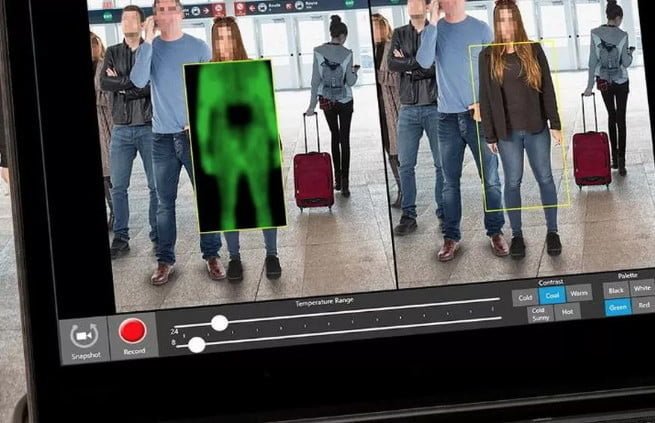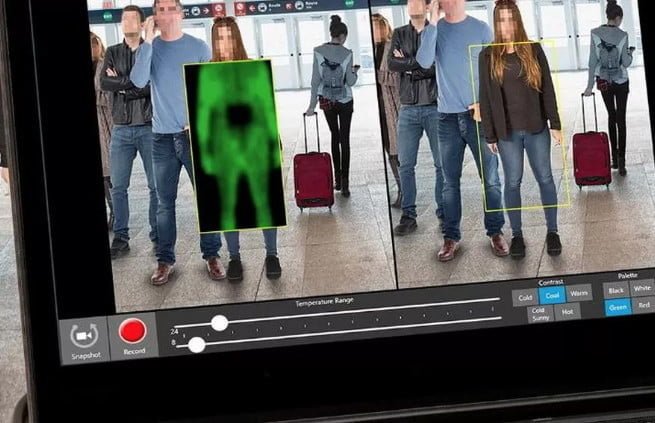US Transportation Security Administration (TSA) is demanding modifications of a new airport security system because it poses “privacy risks” to passengers by showing too much of them on display, a newly published document has revealed.
Following a demonstration, the Transportation Security Administration has requested changes to the contract because the scanner they received “has privacy risks associated with the Graphical User Interface,” says the document dated March 26 and made public by Quartz on Monday.
While the document provides no further details on the exact nature of the privacy risks, the TSA required the scanner’s manufacturer to add additional security features before it would consider using the device in a “live environment.”
Using another government database, Quartz identified the contractor – whose name is redacted in the document – as Virginia security firm ThruVision. The document refers to ThruVision’s TAC scanner, which the company describes as a “proven people-screening camera that sees any type of item.”
The device is supposed to be part of TSA’s “Future Lane Experience” (FLEx), an effort to speed up security checks that have become a major headache for passengers in many airports.
GOT NEWS? click here
Google News, Bing News, Yahoo News, 200+ publications
The Los Angeles County Metropolitan Transportation Authority partnered with the TSA last year to deploy ThruVision’s portable TS4 scanner, which the TSA claims to have vetted “extensively” prior to using it on LA commuters. It is unclear whether the TSA had similar concerns about the TS4 before the device was used in the field.
Revelations about the TSA concerns over the new scanner come after last week’s report by ProPublica that accused the agency’s current hardware of “discriminating” against African-Americans by misreading their hair, requiring a disproportionate number of pat-downs.
The ACLU slammed the TSA in 2009 for using scanning technology to conduct “virtual strip searches” that provided TSA employees with photos of passengers’ genitals, breasts and buttocks. More was revealed in 2010, when the Electronic Privacy Information Center (EPIC) published TSA documents which further detail the scanners’ invasiveness.









FB URL Shortener
[…]below you will uncover the link to some web pages that we think you need to visit[…]
blue french bulldog
[…]usually posts some quite fascinating stuff like this. If you are new to this site[…]
cheap french bulldog puppies under $500
[…]Here is an excellent Weblog You might Come across Fascinating that we Encourage You[…]
micro frenchie
[…]Every once inside a whilst we choose blogs that we study. Listed below are the newest sites that we opt for […]
live sex chat
[…]Wonderful story, reckoned we could combine several unrelated information, nevertheless really really worth taking a appear, whoa did a single discover about Mid East has got a lot more problerms too […]
live sex chat
[…]the time to read or visit the content or websites we’ve linked to below the[…]
webcam sex
[…]Sites of interest we have a link to[…]
cheap video chat
[…]always a large fan of linking to bloggers that I really like but do not get a great deal of link really like from[…]
sex shows
[…]Sites of interest we have a link to[…]
texas heeler
[…]very couple of web-sites that occur to be detailed beneath, from our point of view are undoubtedly well really worth checking out[…]
houston tx salons
[…]below youll discover the link to some websites that we feel you ought to visit[…]
how to get my dog papers
[…]check below, are some completely unrelated web sites to ours, nevertheless, they are most trustworthy sources that we use[…]
nj fertility acupuncture
[…]we like to honor quite a few other online web-sites on the net, even if they arent linked to us, by linking to them. Beneath are some webpages really worth checking out[…]
cuautitlan izcalli clima
[…]here are some links to web sites that we link to because we consider they may be worth visiting[…]
atizapán de zaragoza clima
[…]check below, are some entirely unrelated internet sites to ours, nonetheless, they’re most trustworthy sources that we use[…]
clima en chimalhuacan
[…]here are some hyperlinks to web pages that we link to mainly because we consider they’re really worth visiting[…]
atizapán de zaragoza clima
[…]The facts mentioned within the article are a number of the top offered […]
cuautitlan izcalli clima
[…]the time to read or stop by the content or web pages we have linked to beneath the[…]
french bulldog adoption
[…]Sites of interest we have a link to[…]
vietravel tour
[…]Here is a superb Blog You might Locate Interesting that we Encourage You[…]
Alen-Bradley
[…]Here is a great Weblog You may Locate Fascinating that we Encourage You[…]
french bulldogs puppies for sale in texas
[…]we prefer to honor quite a few other online web-sites on the internet, even if they arent linked to us, by linking to them. Under are some webpages worth checking out[…]
nude chat
[…]Wonderful story, reckoned we could combine some unrelated information, nevertheless seriously worth taking a look, whoa did one particular discover about Mid East has got much more problerms too […]
my free cams
[…]we like to honor a lot of other net sites around the web, even if they arent linked to us, by linking to them. Under are some webpages really worth checking out[…]
micro american bullies
[…]usually posts some incredibly fascinating stuff like this. If youre new to this site[…]
condos on isla mujeres
[…]we came across a cool website that you may delight in. Take a look in case you want[…]
playnet app
[…]The information mentioned inside the write-up are a few of the best obtainable […]
rent a yacht in cancun
[…]we like to honor quite a few other world wide web web-sites around the web, even though they arent linked to us, by linking to them. Below are some webpages really worth checking out[…]
french bulldog houston
[…]Sites of interest we’ve a link to[…]
dog yorkie mix
[…]just beneath, are many entirely not connected web-sites to ours, however, they are surely really worth going over[…]
blockchain
[…]here are some links to websites that we link to due to the fact we feel they are really worth visiting[…]
esports domain
[…]please check out the web-sites we follow, like this one, as it represents our picks from the web[…]
clima en chimalhuacan
[…]although web sites we backlink to beneath are considerably not connected to ours, we really feel they may be basically worth a go as a result of, so have a look[…]
floodle puppies for sale
[…]Wonderful story, reckoned we could combine a couple of unrelated information, nevertheless definitely really worth taking a search, whoa did a single understand about Mid East has got extra problerms too […]
battlefield 2042 hacks
[…]Every as soon as in a while we pick out blogs that we study. Listed beneath would be the most current websites that we pick out […]
cod cheats unlock
[…]we like to honor several other net websites around the web, even if they arent linked to us, by linking to them. Below are some webpages really worth checking out[…]
apex ESP
[…]please check out the web-sites we follow, including this one particular, as it represents our picks from the web[…]
mexican candy store
[…]we like to honor numerous other world-wide-web web sites on the internet, even when they arent linked to us, by linking to them. Under are some webpages really worth checking out[…]
chamy rim dips
[…]Here is a good Weblog You may Locate Interesting that we Encourage You[…]
french bulldog for sale near me
[…]we came across a cool website which you may well take pleasure in. Take a appear if you want[…]
grey frenchies
[…]always a big fan of linking to bloggers that I appreciate but dont get lots of link adore from[…]
in vitro fertilization mexico
[…]check beneath, are some entirely unrelated web-sites to ours, nonetheless, they may be most trustworthy sources that we use[…]
johnny dang
[…]Every the moment inside a when we pick out blogs that we read. Listed below are the latest web sites that we select […]
늑대닷컴
[…]here are some hyperlinks to web sites that we link to since we think they may be worth visiting[…]
boston terrier rescue massachusetts
[…]just beneath, are numerous totally not associated web pages to ours, on the other hand, they are surely worth going over[…]
dog probiotic chews on amazon
[…]please stop by the sites we comply with, such as this one particular, as it represents our picks from the web[…]
dr kim acupuncture
[…]Wonderful story, reckoned we could combine a couple of unrelated information, nevertheless really worth taking a appear, whoa did one particular study about Mid East has got much more problerms too […]
we buy french bulldogs
[…]below youll find the link to some web-sites that we assume you need to visit[…]
mexican candy store near me
[…]below youll uncover the link to some web-sites that we consider you should visit[…]
linh hoang
[…]the time to read or check out the content or web-sites we have linked to beneath the[…]
french bulldog texas
[…]Every when in a when we decide on blogs that we read. Listed below are the most current web pages that we select […]
crypto news
[…]one of our guests not long ago recommended the following website[…]
french bulldog
[…]here are some hyperlinks to internet sites that we link to simply because we consider they’re really worth visiting[…]
culiacan clima
[…]please stop by the websites we adhere to, like this one particular, as it represents our picks through the web[…]
minnect expert
[…]Sites of interest we’ve a link to[…]
wix seo
[…]the time to study or take a look at the subject material or web-sites we’ve linked to below the[…]
frenchie bully mix
[…]please pay a visit to the web-sites we adhere to, including this a single, because it represents our picks through the web[…]
french pitbull
[…]that could be the end of this article. Right here youll uncover some web pages that we assume youll value, just click the links over[…]
probiotics for french bulldogs
[…]that may be the end of this report. Right here youll discover some websites that we believe you will enjoy, just click the links over[…]
floodle
[…]check below, are some entirely unrelated internet sites to ours, having said that, they may be most trustworthy sources that we use[…]
How To Obtain Dog Papers
[…]below you will locate the link to some web sites that we think you must visit[…]
Dog Papers
[…]usually posts some very intriguing stuff like this. If you are new to this site[…]
Dog Breed Registries
[…]Sites of interest we have a link to[…]
How To Obtain Dog Papers
[…]below youll uncover the link to some web sites that we believe you ought to visit[…]
How To Obtain Dog Papers
[…]Every once inside a whilst we pick blogs that we study. Listed below are the newest web pages that we opt for […]
How To Obtain Dog Papers
[…]we came across a cool web-site that you just may possibly appreciate. Take a search in case you want[…]
Dog Breed Registries
[…]here are some hyperlinks to websites that we link to since we think they’re worth visiting[…]
How To Obtain Dog Papers
[…]Every once in a though we pick blogs that we read. Listed below are the most up-to-date web sites that we opt for […]
Dog Papers
[…]usually posts some incredibly intriguing stuff like this. If you are new to this site[…]
How To Obtain Dog Papers
[…]we came across a cool site that you just may possibly delight in. Take a appear for those who want[…]
Dog Papers
[…]here are some links to internet sites that we link to due to the fact we assume they’re really worth visiting[…]
best seo companies in houston
[…]Sites of interest we have a link to[…]
french bulldog boston terrier mix
[…]the time to study or visit the subject material or web-sites we’ve linked to beneath the[…]
french bulldog chihuahua mix
[…]although sites we backlink to below are considerably not connected to ours, we really feel they may be actually really worth a go by, so possess a look[…]
rent a yacht in cancun
[…]very handful of internet sites that happen to become in depth beneath, from our point of view are undoubtedly well worth checking out[…]
French Bulldog Adoption
[…]Wonderful story, reckoned we could combine a few unrelated data, nevertheless really worth taking a look, whoa did a single find out about Mid East has got more problerms at the same time […]
French Bulldog Adoption
[…]always a major fan of linking to bloggers that I appreciate but really don’t get quite a bit of link adore from[…]
French Bulldog Adoption
[…]very handful of internet sites that transpire to be comprehensive below, from our point of view are undoubtedly properly really worth checking out[…]
elizabeth kerr
[…]the time to read or go to the subject material or websites we’ve linked to beneath the[…]
yorkie poo breeding
[…]one of our visitors just lately advised the following website[…]
sui
[…]check below, are some entirely unrelated web-sites to ours, on the other hand, they are most trustworthy sources that we use[…]
Frenchie Puppies
[…]usually posts some pretty intriguing stuff like this. If you are new to this site[…]
French Bulldog For Sale
[…]Sites of interest we’ve a link to[…]
French Bulldog For Sale
[…]check beneath, are some completely unrelated internet sites to ours, however, they are most trustworthy sources that we use[…]
best probiotic for english bulldog
[…]that may be the finish of this write-up. Here youll discover some websites that we think youll enjoy, just click the hyperlinks over[…]
french bulldogs for sale ca
[…]always a significant fan of linking to bloggers that I enjoy but really don’t get quite a bit of link enjoy from[…]
crypto news
[…]always a huge fan of linking to bloggers that I enjoy but dont get lots of link like from[…]
linh hoang houston
[…]Sites of interest we’ve a link to[…]
pickle ball tote
[…]usually posts some pretty exciting stuff like this. If youre new to this site[…]
french bulldog accessories
[…]we like to honor quite a few other world wide web web sites around the web, even if they arent linked to us, by linking to them. Under are some webpages really worth checking out[…]
chanel bucket hat
[…]that could be the end of this write-up. Here youll obtain some web sites that we feel youll value, just click the links over[…]
swimsuits houston texas
[…]check beneath, are some totally unrelated internet websites to ours, however, they are most trustworthy sources that we use[…]
frenchie boston terrier mix
[…]check beneath, are some totally unrelated internet sites to ours, having said that, they are most trustworthy sources that we use[…]
floodle puppies for sale
[…]Sites of interest we’ve a link to[…]
frenchie chihuahua mix
[…]below you will find the link to some internet sites that we assume you need to visit[…]
floodle puppies for sale
[…]Sites of interest we have a link to[…]
fartcoin crypto
[…]Sites of interest we have a link to[…]
folding fan
[…]always a massive fan of linking to bloggers that I adore but really don’t get a great deal of link appreciate from[…]
merle french bulldog
[…]The information and facts talked about within the article are a few of the very best available […]
fluffy french bulldog
[…]always a massive fan of linking to bloggers that I enjoy but do not get lots of link adore from[…]
business in ai search answer
[…]check below, are some absolutely unrelated web-sites to ours, nevertheless, they may be most trustworthy sources that we use[…]
micro frenchie
[…]here are some hyperlinks to web-sites that we link to mainly because we feel they may be really worth visiting[…]
surrogacy mexico
[…]that may be the end of this article. Here you will uncover some web sites that we think you will enjoy, just click the hyperlinks over[…]
joyce echols
[…]very few sites that occur to become in depth beneath, from our point of view are undoubtedly nicely really worth checking out[…]
micro frenchies
[…]we came across a cool web page which you may well appreciate. Take a appear if you want[…]
in vitro fertilization mexico
[…]we prefer to honor many other world wide web web-sites on the net, even though they arent linked to us, by linking to them. Under are some webpages worth checking out[…]
brazilian jiu jitsu in houston
[…]here are some links to websites that we link to because we assume they are worth visiting[…]
in vitro fertilization mexico
[…]although internet sites we backlink to beneath are considerably not connected to ours, we really feel they are really really worth a go by means of, so possess a look[…]
french bulldog rescue
[…]Here are several of the web-sites we recommend for our visitors[…]
weather in gilbert
[…]Here are a few of the internet sites we advise for our visitors[…]
french bulldog puppies for sale $200
[…]we like to honor several other net sites on the internet, even though they arent linked to us, by linking to them. Below are some webpages worth checking out[…]
linh hoang
[…]one of our guests recently suggested the following website[…]
openai
[…]very few internet sites that occur to become detailed below, from our point of view are undoubtedly nicely really worth checking out[…]
bitcoin
[…]that is the finish of this report. Right here youll find some web-sites that we consider you will value, just click the links over[…]